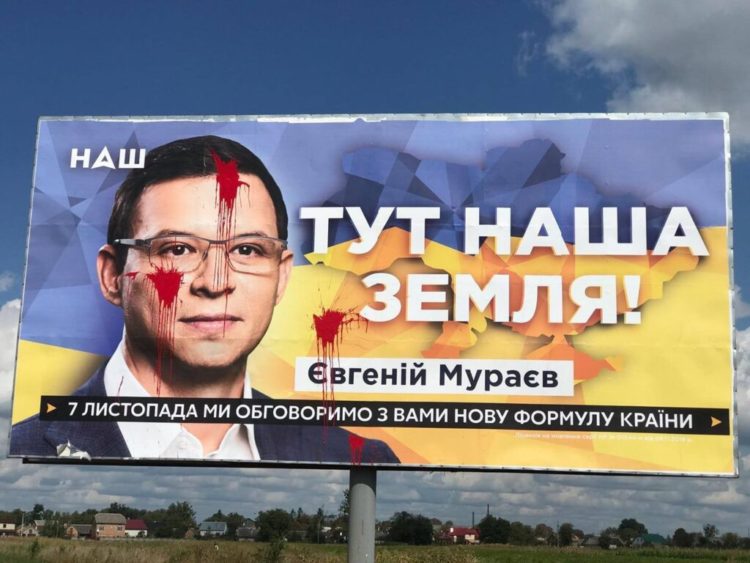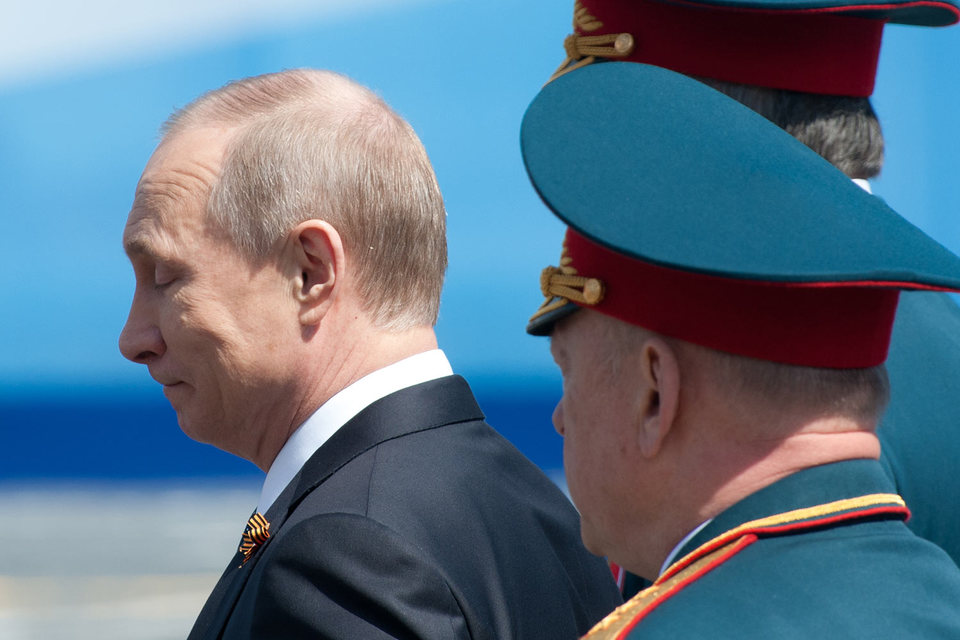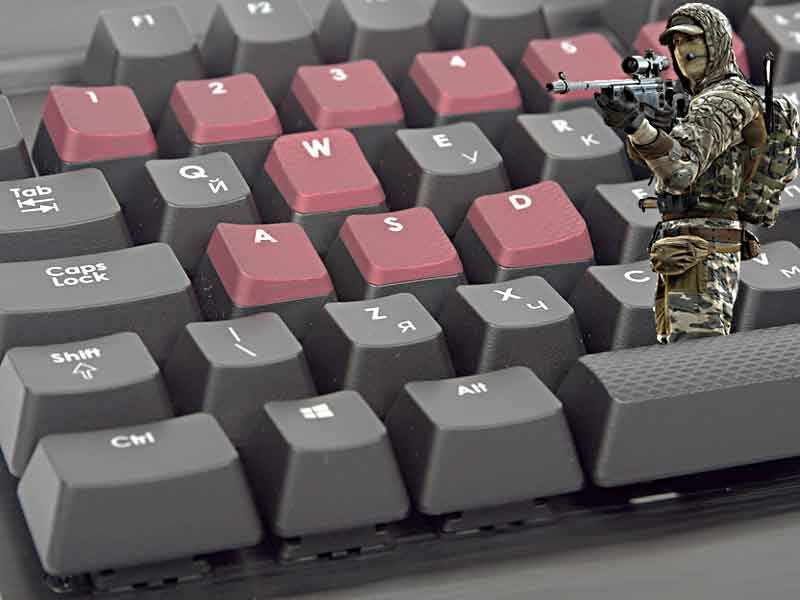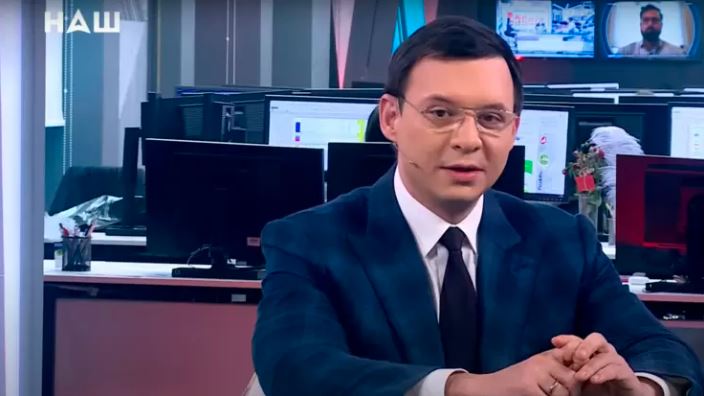The UK government has warned about a Kremlin plan to install a loyal government in Ukraine as Russia mulls whether to invade. One of the candidates is Yevhen Murayev, a pro-Russian politician who is paradoxically under Russian sanctions. Here is what we know about him.
British official warnings
In a statement published late on 22 January by the British foreign office, the foreign secretary warned that the UK has information indicating that Russia is planning to install a pro-Russian leader in Kyiv as it considers whether to invade Ukraine or not, and the former Ukrainian MP Yevhen Murayev is being considered as a potential candidate for the position.
Former Ukrainian politicians who fled Ukraine following the Euromaidan Revolution were named as contact persons for Russian intelligence. Some of them were said to have "contact with Russian intelligence officers currently involved in the planning of an attack on Ukraine":
- Serhiy Arbuzov, First Deputy Prime Minister of Ukraine from 2012-2014, and acting Prime Minister in 2014
- Andriy Kluyev, First Deputy Prime Minister from 2010-2012 and Chief of Staff to former Ukrainian President Yanukovych
- Vladimir Sivkovich, former Deputy Head of the Ukrainian National Security and Defence Council (RNBO)
- Mykola Azarov, Prime Minister of Ukraine from 2010-2014
Foreign Secretary Liz Truss said that
"the information being released today shines a light on the extent of Russian activity designed to subvert Ukraine, and is an insight into Kremlin thinking. Russia must de-escalate, end its campaigns of aggression and disinformation, and pursue a path of diplomacy. As the UK and our partners have said repeatedly, any Russian military incursion into Ukraine would be a massive strategic mistake with severe costs."
The UK statement did not provide further details.
UK's deputy prime minister Dominic Raab said there was "a very serious risk" of invasion but there would be "severe economic consequences", including sanctions, if Russia took that step. However, it was "extremely unlikely" British troops would be sent to defend Ukraine because the country is not a NATO ally, BBC reported.
Britain provided this information to its partners in advance, and it appears that several world media outlets received it before it was made public. For instance, shortly after the publication of the statement, the New York Times came out with a detailed, pre-prepared article. Interlocutors in Washington confirmed that this information was gathered by British intelligence and that in the opinion of the American authorities it is correct. According to the division of functions in the informal alliance of Western intelligence services known as "Five Eyes," the UK is responsible for intercepting Russian communications, which was the source of this data.
Meanwhile, sources that CNN had spoken to confirmed that the US has similar evidence to the UK.
"Yes, we have seen intelligence that Russia is looking at ways to minimize a long, drawn-out war. That includes things like installing a friendly government and using its spy agencies to foment dissent," one source said.
Recent US sanctions for coup do not name Murayev
Interestingly, the UK warning does not mention Oleh Voloshyn and Taras Kozak, two of four Ukrainian nationals whom the US on 21 January placed under sanctions for helping Russian intelligence recruit current and former Ukrainian officials to prepare a coup and control Ukraine’s critical infrastructure with an occupying Russian force.
US sanctions four Ukrainians for destabilizing Ukraine on behalf of Russian government
But it does mention Vladimir Sivkovich, the former Deputy Secretary of the Ukrainian National Security and Defense Council, who the US Department of the Treasury’s Office of Foreign Assets Control said worked with a network of Russian intelligence actors to carry out influence operations that attempted to build support for Ukraine to officially cede Crimea to Russia in exchange for a drawdown of Russian-backed forces in the Donbas in 2021.
OFAC stated that in early 2020, Sivkovich coordinated with Russian intelligence services to promote the disinformation campaign against the US 2020 presidential election of Ukrainian MP Andriy Derkach.
Who is politician Yevhen Muraev?
Hailing from the Kharkiv Oblast, Murayev is a pro-Russian Ukrainian politician who from 2018 has headed the Nashi ("Ours") party which is not represented in the Ukrainian parliament. Formerly, he headed the political council of the For Life ("Za Zhyttia") party, which after a merger is now called the Opposition Platform For Life and is currently Ukraine's main pro-Russian political party.
Before that, he was elected to the regional council of Kharkiv Oblast in 2010 from the Party of Regions, headed by now-fugitive Ukrainian ex-President Yanukovych who fled Ukraine amid the Euromaidan Revolution in 2014.
In 2014, Murayev helped evacuate Yanukovych's Prime Minister Mykola Azarov, who is also mentioned in the UK warning, from Kharkiv to Russia.
During Ukraine's 2019 elections, Murayev was the frontrunner of the Opposition Bloc, another pro-Russian party formed from the remainder of exiled ex-President Yanukovych’s Party of Regions that had disintegrated in 2014.
In 2019, Murayev also ran for president, but two months after being registered withdrew his candidacy in favor of Oleksandr Vilkul, the deputy of Viktor Yanukovych's Prime Minister Azarov.
With the start of Russia's war against Ukraine, Murayev has consistently spread pro-Russian narratives. He claimed that the war between the Russian puppet "republics" and the Ukrainian government in Donbas is a "civil conflict" because "Russia is helping the Donetsk and Luhansk 'People's Republics' with money, equipment, and instructors, just as the United States has helped the Ukrainian Armed Forces and the National Guard." He spread disinformation that US soldiers from Greystone and Blackwater took part in the Ukrainian liberation of Mariupol, and claimed that Ukraine's authorities benefit from Russia's war against Donbas and the occupation of Crimea.
Murayev advocates for Ukraine to return to its non-aligned status which it abandoned after the onset of Russian aggression, in 2019 enshrining in its Constitution a strategic course for integration with the EU and NATO. He also believes that the association with the EU should be reviewed "in favor of Ukraine or be abandoned altogether." As well, he called Ukraine's 2014 Euromaidan revolution, which sent pro-Russian President Viktor Yanukovych fleeing, a "coup d'etat."
A sociological poll held by the Rating Group in December 2021 found that 6.5% of Ukrainian voters would cast their ballots for Murayev and 5.2% would vote for his party Nashi. The poll found that Murayev's voters are the largest skeptics of Ukraine's integration into the EU and NATO, and also most critical of the central government.
In 2018 Murayev was placed under Russian sanctions in a move that many Ukrainians saw as sensational. This was because the wave of Russian sanctions targeted many Ukrainian politicians seen as pro-Russian in Ukraine. Ukrainian MP Valeriy Karpuntsov said back then this could be seen as Russia's operation to cover up its agents of influence.
Murayev himself then claimed that he had been placed on the list because of a conflict with Viktor Medvdechuk, who is widely seen as Russian President Vladimir Putin's point man in Ukraine.
The politician dismissed the British government warning, arguing that he has been sanctioned by Russia and that he does not maintain any connections with the country:
"This is nonsense. I have been banned from entering Russia for four years. If I had assets in Russia, they would be frozen, although I never had anything there. You can see my program - we have a different vision of the country's development. Ukraine must be a strong and sovereign state. Therefore, it is difficult to imagine that I have any communication with the Russians. I believe that the information we see now is unprofessional. Therefore, I hope to receive an apology."
However, Ukraine's government does not see the warning as "nonsense." Commenting on the news, advisor to Ukraine's President's Office Mykhailo Podoliak told the BBC that British intelligence has not said anything that Ukrainians did not already know, although Kyiv "has no doubt that the British government understands very clearly, in detail, in personalities, what is happening in Ukraine."
He detailed that from the onset of the war in 2014, the Russian government had used a part of albeit marginal, but existing political and civil society structures and actors in its interests.
He referred to these actors as "political proxies for a permanent attack on Ukrainian society from within."
As well, Podoliak called Muraev's comments about Russian sanctions against him as "frankly strange."
"Russia's sanctions against him were imposed obviously not because Murayev stood for Ukraine's independence, but because he competed with Medvedchuk for the possibility of promoting Russia's interests," said the spokesman for the President's Office, adding that the state of relations between Russia and were a question for law enforcers.
Owner of Nash, a pro-Russian TV channel
Murayev's inroads into Ukraine's mediasphere started in 2014, when he gained ownership of the Kharkiv Internet-channel Robinzon-TV, website MIGnews, and news channel NewsOne, which had repeated come under fire, facing accusations of being a tool of anti-Ukrainian propaganda.
Murayev owned NewsOne until 2018, when it came into the hands of, briefly, Yanukovych's former Deputy of the President's Administration Andriy Portnov, and then, Taras Kozak, a pro-Russian MP who is a close business associate of Putin's "compadre" in Ukraine, the pro-Russian politician Viktor Medvedchuk.
Ukraine's National Defense and Security Council sanctioned NewsOne, among other TV channels, in 2021. After this ban, other pro-Russian channels in Ukraine became more prominent. Among them is the Murayev-owned Nash.
Murayev continued his media ownership path by founding the TV channel Nash in 2018. It became more prominent after the ban on the main pro-Russian channels: nearly half of their viewers migrated to Murayev's project, and it became a TV-flagship for pro-Russian propaganda in Ukraine.
Russian propaganda’s main message to Ukraine: you’re under “external governance” – study
It has caused scandals in Ukraine's media sphere by interviewing the fugitive ex-PM Mykola Azarov, polling its viewers on whether Vladimir Putin should receive the Nobel Peace Prize (76% said "yes"), and holding a TV-bridge with a representative of the Russian proxy "Donetsk People's Republic," and broadcasting a video clip on Ukraine's Independence Day implying that the state is under external governance.
For the TV-bridge and video clip, Nash was fined over UAH 200,000 ($7,000) by Ukraine's national media regulator.
Apart from virulently anti-Ukrainian rhetoric, Nash has been accused of racism and antisemitism.
In September 2021, Ukraine's National Media Regulator sanctioned and fined the channel over a repeatedly broadcasted episode where Murayev claimed that a "genocide" and "war against the Ukrainian people as part of the Slavic world" is being carried out by the countries of the EU. The Regulator found the channel violated legal norms regarding hate speech and inciting hatred.
Nash can be viewed as an essential part of a pro-Russian media ecosystem working to push several anti-Ukrainian metanarratives, among which the metanarrative of "external governance," which claims that Ukraine is not an independent state but actually sagoverned by external Western forces, is the "glue" holding it all together.
Together with other TV resources owned by pro-Russian figures and social media resources like Viber groups, Nash has played a role in inciting panic and coronavirus riots against the first batch of tourists evacuated from China in a small Ukrainian town.
The pro-Russian network behind coronavirus riots in a small Ukrainian town
In September 2021, billboards advertising Nash's new project "Here is our land" started appearing all over Ukraine, eliciting dissatisfaction from activists, who lobbied to have them taken down, and falling victim to vandalism. A billboard put up in central Kyiv was taken down in less than an hour.

Media analyst Yaroslav Zubchenko notes that the TV channel was created to promote Murayev and that it is indeed the primary activity of the channel: it serves to air his messages that do not get challenged by presenters and journalists.
Meanwhile, writing for the media watchdog Detektor Media, Otar Dovzhenko stated that the provocative stunts of Nash are an "electoral technology that should help Yevhen Murayev win the casting for the position of the main pro-Russian candidate in the upcoming parliamentary elections," in this way competing with Yuriy Boiko, the presidential candidate from the pro-Russian Opposition Bloc For Life.
Related:





